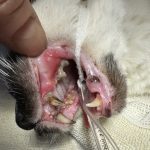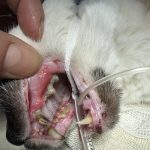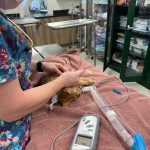Hello
I’m sorry to hear about your friends cat. I’m also not sure what advice I can give as I don’t. Know what kind of injury or diagnosis this is.
I do however think it is important to be honest about your financial abilities and express that to the surgeon. It is perfectly acceptable to ask for affordable treatment options and insist that they be provided.
We’ve had my dog for 6+ years. Up until about 3 months ago, he never got in the garbage and only stole food off a counter one time that we’ve known of. However, this is not the case now. For the last three months, he has started regularly getting into the garbage and recycling bags. He stole a loaf of bread off the counter the other day. The only thing we can think of that has changed is that we started giving our cat wet food instead of dry. But it seems weird that this would be the thing to trigger the behavior. Any ideas? And what can we do to train him out of it? He only does this when we are out of the house.
Comments
My cats are patients of Jarrettsville Vet. I am reaching out please to get information for my friend. They are located in Michigan and Her 7 year old indoor cat hurt its back leg. Her vet told her that she needed to see an orthopedic specialist because the cat tore a ligament. They made an appointment and were told it would run $250 for the visit plus whatever they needed to do to identify the problem and surgery could cost up to $8000. They are a young couple with a small daughter, and are looking for other options. I thought I had seen a video that Dr. magnifico did regarding anti-inflammatories, pain meds, and cage rest. Can you please Point us in the right direction as to what she should do. I recommended that she contact her vet to see if those options were available to her through them and she could try that route first before seeing a surgeon. I am so blessed and grateful that Jarrettsville Vet is close to me and offers options such as those. Any and all advice would be greatly appreciated! Her appointment at the surgeon is tomorrow.
Comments
My 16 year old cat has hard poop it hurts him to pass. I helpped him pass a hard peice last night in the tub with warm water.
I have to release his anal glands every so often. I plan on giving him an enima via puppy feeding tubes with 1/3 pet Ema, 1/3 water soluble medical lube and 1/3 warm water.. with a totally amount of 30cc
Questions are can I use tap water or should I use distilled? Can I use puppy feeding tube.
He gets wet food in the morning and dry at night I am going to give him just wet from now on and I was hoping to find a laxative that is safe to use for everyone humans dogs and cats.
I might start giving him iv fluids under his skin because he’s never drank enough water.
Thank you
Comments
Please help with removing nasal polyp.
Hello,
My girlfriend has a cat she rescued almost 10 years ago. Her name is Kitty.
She has quite a bit of difficulty breathing. We have taken here to and from several local veterinary hospitals and they have prescribed various antibiotics and steroids.
After almost 6 months these seem to offer little relief to our poor little Kitty.
I am willing and able to drive Kitty anywhere within 500miles to try to remove the polyp. We can stay for a few days if you need us to.
The local hospitals want over $10k total in several rounds of scans, xrays and preoperative over several weeks. We can’t afford this. Someone will be be able to make a real difference in Kitty’s life they would agree to meet with her and do what they can.
I would also add that my girlfriend has a deep love of animals. She regularly helps local shelters and hard luck cases like when she found Kitty. She cleans and grooms pets for a living and volunteers her services to local shelters. You would be making an incredible gift to her. I don’t have $10000 but I would gladly pay fairly for the procedure and arrange for our travel to you.
Looking forward to your reply.
Thank you,
Chris
Comments
My 18 year old cat (long hair) has been having some issues for about 2 weeks now. On 2/10/24 he started throwing up at breakfast and didn’t want dinner, Stopped drinking and eating from that point and howl crying by sunday night into Monday. Got hospitalized on Monday the 12th got labs done, a urinalysis, semi ultrasound and xrays. He was severely dehydrated, negative for UTI, severely anemic (6.8 range was 10.9-15 ). Over night he got IV fluids and antibiotics and ate some the morning, labs were normal by discharge except for anemia. Xray ray did reveal, distended stomach with gas, arthritis, one small kidney. He came home didn’t really eat much, followed up with regular vet got subq fluids and appetite stimulant (rubs on ear), 1-2 days after he ate like a horse mostly broths and liquids foods. He is now constipated and vomiting again, not eating and lethargic. Took him to the vet 2/24/24 for subq fluids vet also gave him an enema. He has not pooped still its been about 30 hours. I tried to give him gabapentin yesterday but he threw up. This morning he threw up “poop” like vomit. We gave him 1/2 ish teaspoon of miralax this morning threw up a little while later more poop like vomit. Seems to have broken a bit of his k9 tooth off also, doesnt seem to bee botbering him… We are considering doing at home mineral oil enema with a baby enema glycerin suppository with more miralax. He has eaten a tiny bit of Broth treat today and gotten outside for 2 walks. Are we doing the right steps ? Is there more or less we should be doing ? Trying to get to a more equipped vet hospital but probably won’t be until Tuesday 2/2724. Should I seek emergency medical attention or waiting until Tuesday be okay. Planning to take him to regular small vet tomorrow for subq at the least.Please help.
















First: get a full “senior” bloodwork panel done. Rule out anything medical.
Second: hide all trash and all food. Counter and garbage surfing are self-reinforcing. Lock the trash away, get a locking can. Remove all food from all counters and put them in a secure cabinet. Lock the fridge with a child lock, if necessary.
Third: Crate when you can’t supervise.
This is usually medical if it’s sudden like this, but you need to be proactive in your prevention, and it’s always a multiprong approach.
Thank you!